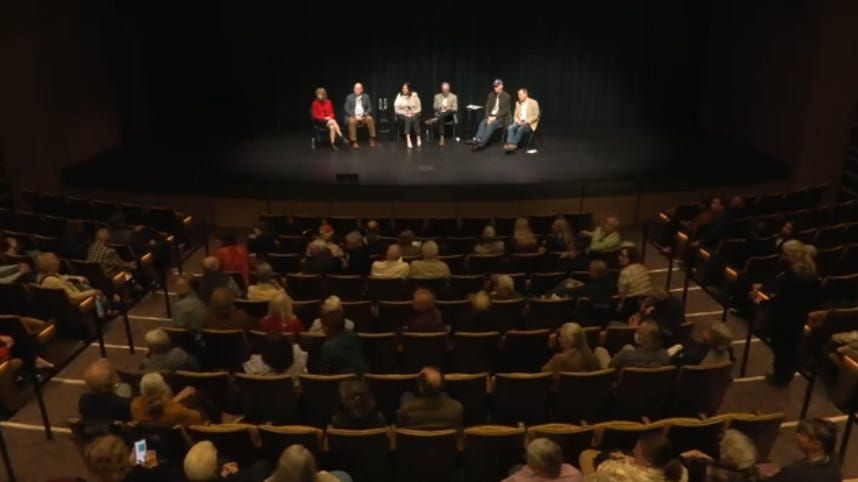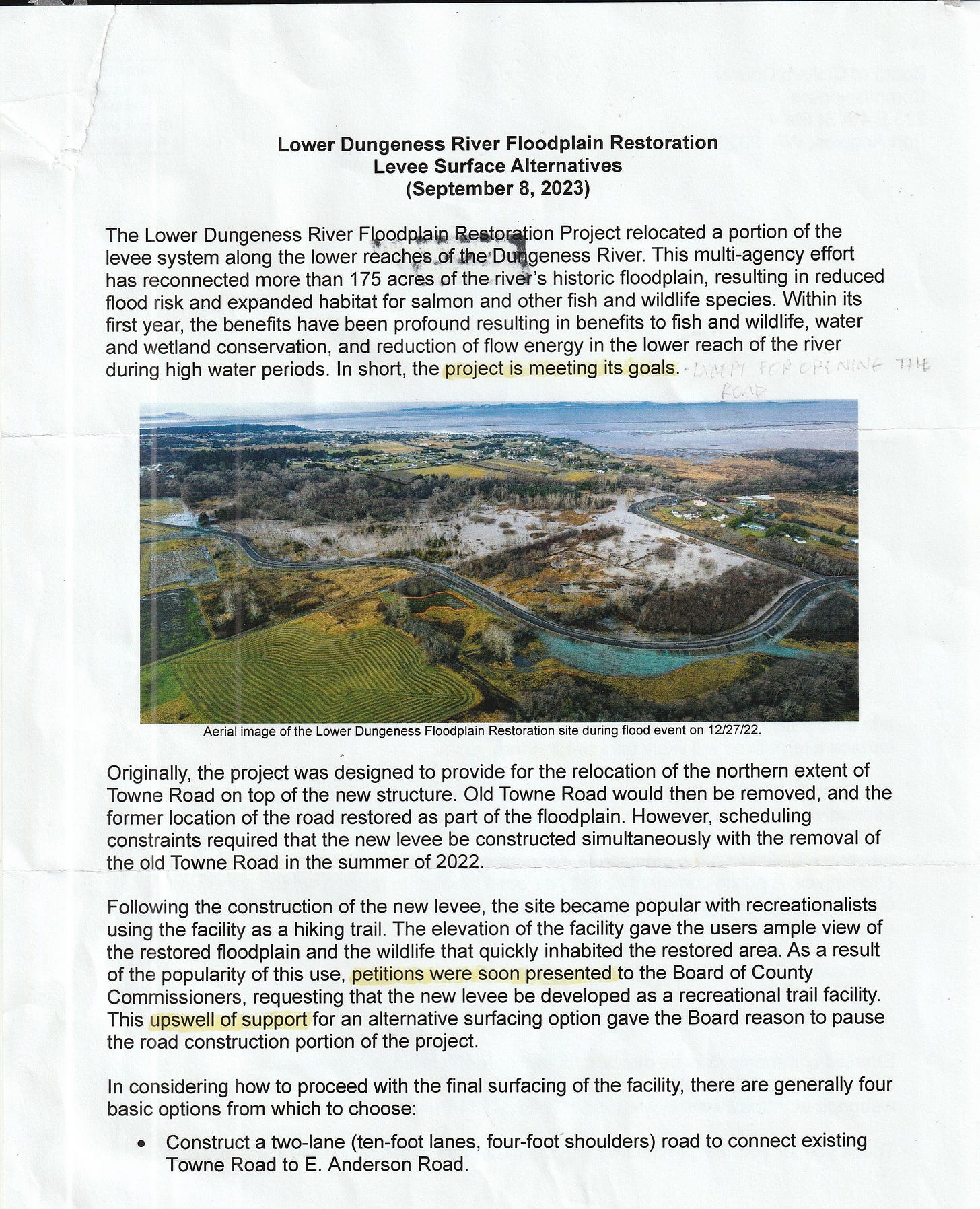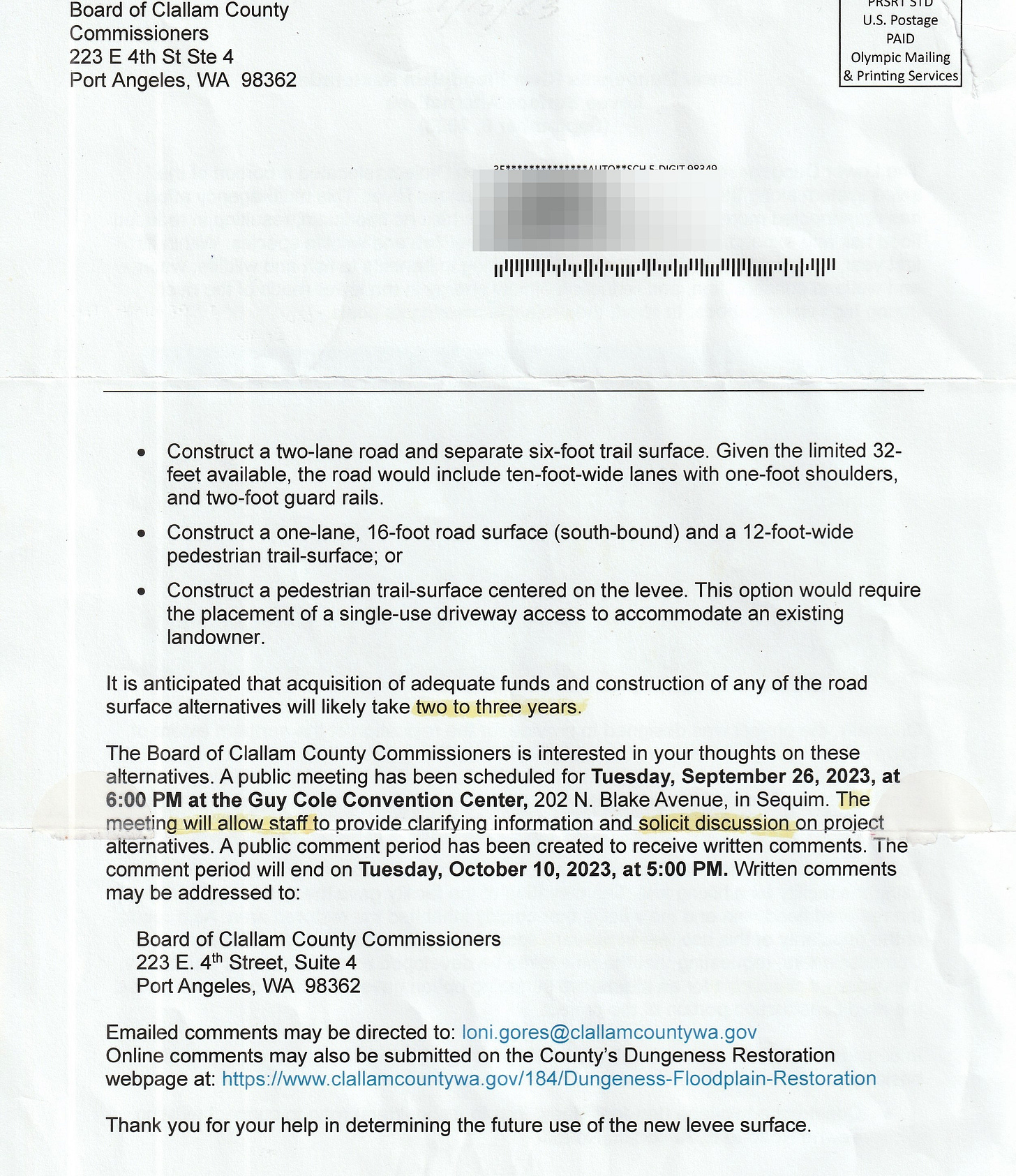When a privately owned newspaper asks the public to fund its survival through donations and potential tax hikes, can it still hold government accountable?
If you’ve ever had the honor of spending the final hours with a loved one in hospice or comfort care, you know what a death rattle is. It’s the sound at the back of the throat—a wet, crackling rattle, sometimes with a gentle moan. It means vital systems are shutting down. It means the end is near.
And it’s exactly what 180 locals gathered to hear from the Peninsula Daily News (PDN) two weeks ago at a forum titled The Importance of Local Journalism.
Like all events at Field Hall, it opened with a land acknowledgment: “The ground we are on is the traditional land of the Klallam or S’Klallam Strong People, and they have stewarded the land for thousands of years, and we are using it currently.”
Brown Maloney, former owner of the Sequim Gazette and Forks Forum, attributed the downturn of local journalism to Craigslist, Facebook, and Google. “It can’t be ignored, throwing salt in these wounds of ours, and the trusted news organizations, is our very own president wanting to discredit honest journalism.”
The Peninsula Daily News has gone through multiple changes in the past years—none of them reassuring. It’s shrunk in size and substance, no longer prints locally, and its Saturday and Sunday editions are now combined. The Monday edition exists only online. And what once arrived each morning by dedicated carriers now shows up by mail—late and unreliably.
The forum built toward a major announcement: the launch of the Olympic Peninsula Journalism Fund. Its goal is to “preserve and add to our community coverage.” More specifically, it’s a fundraising campaign to create a $1 million endowment to pay the salary of a “community journalist” at the PDN.
This is a privately owned, for-profit newspaper panhandling for $1 million from locals. And oddly, donations aren’t even directed to the newspaper itself. They’re routed through Field Hall, which has volunteered to act as fiscal sponsor. PDN Publisher Eran Kennedy explained the idea of a new reporter as “Someone that is a Jack, a Jill, or a They of all trades.”
It’s a public bailout, via charitable channels, for an institution that is supposed to hold power accountable.
Traditionally, media has been known as The Fourth Estate—a watchdog that keeps government in check. But we’ve entered an era of “press release journalism,” where local governments, like Clallam County, issue press releases that are published verbatim as news.
For example, take this September 21, 2023, article attributed to the then editor of the Sequim Gazette:
Now, compare that article to the flyer created by the Board of County Commissioners and sent to those most affected by the road closure:
“The site became popular with recreationalists… This upswell of support for an alternative surfacing option gave the Board reason to pause… Scheduling constraints required that the new levee be constructed simultaneously.” The words from the article are exactly the same as the meeting notice. That’s not news; it’s press-release journalism.
Meanwhile, elected officials blur the lines between oversight and propaganda. County Commissioner Mark Ozias regularly writes for the Sequim Gazette in the “County Spotlight” section. Not as an opinion column—no, this is framed as neutral information. And surprise: County Commissioner Mark Ozias says county government is doing fantastic!
At the forum, Kennedy revealed that in March, during bankruptcy proceedings, Black Press Media—the Canadian company long thought to own the PDN—was sold to Carpenter Media Group, based in the southeastern U.S.
When markets shift, most businesses adapt or die. But not local newspapers. They cling to nostalgia, continue publishing fluff, and ignore the critical issues that matter most.
For example:
Clallam County’s largest infrastructure project—the relocation of Towne Road—nearly resulted in a mass-casualty flooding event due to a blunder deliberately caused by a sovereign nation, costing taxpayers an additional estimated $10 million.
In Dungeness, hundreds of residents are facing eviction as a county agency and a nongovernmental organization (NGO) are pushing commissioners closer to seizing private property.
The county continues to pour tens of thousands of dollars into plans for a $43 million reservoir—beneath high-voltage power lines and above earthquake faults—with no clearly defined purpose.
And yet, not a word on these stories from our so-called “local watchdogs.”
Instead, the panel’s closing message was: “Subscribe.” In other words, buy the paper not because you want it, but to keep it on life support. (5-day delivery of the PDN costs $197.60 each year).
Kennedy emphasized the PDN’s philanthropic spirit, citing the Peninsula Home Fund, which raised $113,000 this year. She touted their role in the Clallam County Community Service Awards and their involvement in building the Dream Playground, and she claimed that subscriptions allow the PDN to pump $500,000 to $1 million back into the community each year.
But so do many other struggling businesses. Should we bail them out, too?
Toward the end of the evening, Briar Dudley of the Seattle Times declared, “There are multiple things that need to be done to ensure the news industry doesn’t collapse over the next ten or fifteen years.”
Among the proposed solutions: tax credits, a tech surcharge, and grants for hiring journalists. In other words: raise taxes to fund the press.
But if the press is reliant on government for survival, how can it serve as a watchdog of that same government?
It can’t.
The death rattle of local journalism is hard to listen to. But what’s harder—and more dangerous—is pretending it still functions as a check on power while asking the public to fund its silence.






10 years ago refused to pay for a one sided paper that did not publish all views of the local news. I use the paper given to me by a neighbor for fire starter, drying washed windows, lining plant boxes and packing material. We moved to get away from being spoon fed all the control mechanisms and having to dig for the truth elsewhere only to find it was here too, the small convenient things you don’t realize until after making a move, arg!
In communist systems, controlling the press typically involves state ownership and control of media outlets, strict censorship, and suppression of dissenting voices. This ensures that information is presented in a way that supports the ruling party's ideology and agenda.
Censorship:
Censorship is a key mechanism for controlling the press. This involves removing or altering content deemed to be critical of the government or the ruling ideology. Material that promotes alternative viewpoints or challenges the status quo is often suppressed.
Propaganda:
Communist regimes heavily rely on propaganda to shape public opinion and reinforce their ideology. This includes using media to promote positive narratives about the government, glorify leaders, and demonize opponents.
It is not communism yet but it sure comes close to checking off all the boxes.
I get my news from the BullTozzer! The PDN is not an independent voice. Taxing me to fund a mouthpiece of the Kommissioners? I don't think so. And why "print" it? Publish on the Internet and be done with it online.